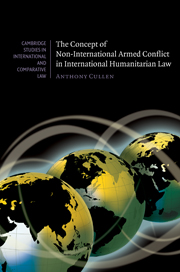Book contents
- Frontmatter
- Contents
- Acknowledgements
- Abbreviations
- Introduction
- PART I Origins of the non-international armed conflict concept and its development in international humanitarian law
- 1 The application of international humanitarian norms to internal conflict prior to the Geneva Conventions of 1949
- 2 Article 3 common to the four Geneva Conventions of 1949 and the threshold of non-international armed conflict in international humanitarian law
- 3 Changes in the scope of non-international armed conflict resulting from the Additional Protocols of 1977
- PART II The anatomy of non-international armed conflict in international humanitarian law
- 6 Conclusion
- Bibliography
- Index
- CAMBRIDGE STUDIES IN INTERNATIONAL AND COMPARATIVE LAW
1 - The application of international humanitarian norms to internal conflict prior to the Geneva Conventions of 1949
from PART I - Origins of the non-international armed conflict concept and its development in international humanitarian law
Published online by Cambridge University Press: 06 July 2010
- Frontmatter
- Contents
- Acknowledgements
- Abbreviations
- Introduction
- PART I Origins of the non-international armed conflict concept and its development in international humanitarian law
- 1 The application of international humanitarian norms to internal conflict prior to the Geneva Conventions of 1949
- 2 Article 3 common to the four Geneva Conventions of 1949 and the threshold of non-international armed conflict in international humanitarian law
- 3 Changes in the scope of non-international armed conflict resulting from the Additional Protocols of 1977
- PART II The anatomy of non-international armed conflict in international humanitarian law
- 6 Conclusion
- Bibliography
- Index
- CAMBRIDGE STUDIES IN INTERNATIONAL AND COMPARATIVE LAW
Summary
In appreciating the significance of recent developments affecting the scope of non-international armed conflict in international humanitarian law, it is important to view the current concept in the context of its historical evolution. Notable influences on the development of the contemporary legal regime for situations of non-international armed conflict are the concepts of belligerency, insurgency and rebellion in traditional international law (the body of law that preceded the regime established by the Geneva Conventions of 1949). These will be explored in this chapter as a means of illustrating the origins of legal concern for adherence to international humanitarian norms in situations of non-international armed conflict. In doing so, changes in the scope of international regulation to the conduct of hostilities will be highlighted.
The practice of recognition and the application of humanitarian norms in traditional international law
The relevance of traditional international law to the concept of non-international armed conflict is an area that is frequently overlooked. However, as the succeeding analysis will show, it merits scrutiny not only as the predecessor of the current legal regime governing situations of non-international armed conflict, but also as the starting point for international concern over adherence to humanitarian standards in such situations. The issue of recognition in traditional international law is studied in this chapter as a means of investigating the application of international humanitarian norms to the conduct of hostilities prior to the formulation of the Geneva Conventions of 1949.
- Type
- Chapter
- Information
- Publisher: Cambridge University PressPrint publication year: 2010
- 1
- Cited by



